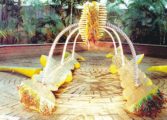Conclusion
We can now revisit our initial distinction between the object-level talk of communities involving the specific learning situations and the meta-level talk of the corporate body. Though some form of meta-level talk is required to articulate the concerns of a community, the particular variety of meta-level talk with the corporate-body picture of the community is neither the necessary nor the only possible one. If the anthropological record on the Indian communities is anything to go by, then, the corporate-body picture is hardly in evidence there.
However, one has to emphasize again that without various object-level distinctions and considerations of a community there is no content to nationalist discourse. The problem occurs when nationalism translates these distinctions into the meta-language of a corporate body. Looking at traditional knowledge systems as a national patrimony rather than as a knowledge patrimony is the best example of this mistake: whereas in the former case the patrimony is looked upon in its possession aspect, i.e. the cultural inheritance is looked upon as in the possession of a corporate body of the nation, in the latter case, the knowledge becomes a patrimony to be re-conceived and re-actualized.
We can illustrate this difference by citing the way nationalist discourse argues for the importance and role of traditional knowledge systems in modern education through the trappings of a claim for the greatness of the Indian civilization. We see this happening in the debate over providing degrees in astrology in modern universities and setting up universities for the study of Sanskrit and various other subjects deemed culturally important. Similar concerns propel the argument for having a greater role for Indian cultural ethos and values, understood variously, and sometimes vacuously, in general education. In all these instances a knowledge system is treated not as a knowledge patrimony but as a national patrimony. Treating a patrimony as knowledge is to acquaint oneself with the ways and means of recognising and handling objects in the way that the particular tradition suggests as appropriate; it is to reconstruct the object-level talk of the knowledge tradition. In contrast to it, the same patrimony can be treated as objects available readily for use without taking into consideration the problem of reconstruction of objects and the relevant means for doing so.
Perhaps an example from far afield of national traditions and customs can drive home this point. Consider the case of teaching physics in the following two contexts: the one context of initiating someone into research and teaching in physics and the other context of advocating the importance of a scientific spirit. In the former, that is, when the focus is on initiating someone into the knowledge patrimony of physics, due attention is paid to the process of reconstructing the means and objects that populate the domain of physics. In effect, the entire discourse in such a case is steeped in the object-level talk of the discipline as there is no other way to appreciate the distinctions and methods operating in the field. In contrast to such an effort, consider the latter case, where the effort is towards using physics as an example for driving home the importance of inculcating a scientific spirit. This agenda requires a meta-level talk which is itself extraneous to, but parasitic on, the considerations of physics; talk which may involve concepts like ‘spirit of enquiry’, ‘rationality’, ‘intellectual and scientific freedom’, ‘human development’, and so on.
Taken to an extreme, the distinction between the object-level and meta-level talk in the instance of physics is itself reminiscent of another distinction: that between science and scientism.[18] While the two sets of distinctions may not map onto each other exactly, it is nevertheless highly instructive to see the correlation between them. Based on our discussion of nationalism earlier, we could suggest the analogy as follows: Scientism is to science as nationalism is to given communities.
In nationalist discourse too, certain distinctions important to a community, (for instance, a particular preference for food, a sense of regard for particular forms of life, like the cow-worship of Hindus, a sense of reverence for places and objects of worship) are taken up outside their object-level talk of the learning context, and pressed into service of a meta-level talk about the corporate identity, freedom and sovereignty of a community. While we are at it, we should also take note of the damage caused by the discourse of liberalism, when it attempts to counter nationalism by treating such sentiments as vacuous or illegitimate. Nationalism, as argued above, derives its support base from the concerns expressed in their object-level talk by different communities. Regardless of whether one is a liberal, a nationalist or neither, it is both a legitimate and an important requirement that the substance of this object-level talk within and of communities be preserved as far as possible. Criticising nationalism, therefore, requires that we attend to the substance of the object-level talk and show how this is distorted in the nationalist meta-level talk rather than summarily erase the object-level talk: a scruple conspicuous in its absence when liberals criticise nationalism.
[I am grateful to the Mātukaté Workshop Series organised by Aarohi Research Foundation and the workshop director Habil Dr. B Narahari Rao for many of the themes developed in this paper]
A .P Ashwin Kumar teaches in Tumkur University where he edits the research journal Pragmata. He is also an academic and literary translator working in English and Kannada.
Notes
[1] A ‘thin’ concept, in the way I am using it here, is typically one which can be applied to individuals without taking into account their cultural background (for example: freedom, equality, right and tolerance) whereas a ‘thick’ concept is necessarily mediated by a community (for example: filial piety, chastity and thrift). While this is not exactly how the standard literature on ethical questions has defined the distinction, the way I have drawn it is not contrary to standard usage.
[2] The phrase is Gramsci’s. (Cited in Pollock, The Language of the Gods in the World of Men, 541.)
[3] For instance, even the following oft-cited works on nationalism, culled from across the entire spectrum of intellectual persuasions and proclivities, consistently treat it as requiring an explanation at the level of what I have chosen to call as ‘rhetorical prejudice’. Anderson, Imagined Communities; Bell, The Cult of the Nation in France; Brubaker, Nationalism Reframed; Gellner, Nations and Nationalism; Kedourie, Nationalism; Colley, Britons; Minogue, Nationalism; Woolf, Nationalism in Europe, 1815 to the Present.
[4] See, for instance, Juergensmeyer, The New Cold War?; Aloysius, Nationalism without a Nation in India; Palshikar, “The BJP and Hindu Nationalism.”
[5] Gandhi and Tagore are the two most important names on this count. Ashis Nandy has developed a similar line of thought. See Gandhi, Hind Swaraj and Other Writings; Tagore, “Swadeshi Samaj”; Nandy, The Illegitimacy of Nationalism; “The Twilight of Certitudes”; “Nationalism, Genuine and Spurious.”
[6] The idea of nation-building usually refers to the efforts of the decolonizing countries to build coherent national groups out of different subject populations left behind by the departing colonial powers. As such, it plays directly into a nationalist imagination. However, ‘nation-building’ here refers to something slightly different. It is part of recognizing that people in countries like India are inheritors of two different traditions: the tradition of modern statecraft and its attendant institutions and the traditions of an older ritual culture passed on mainly through the family milieu. This implies that notions of common life cannot be articulated unless both these inheritances are taken account of. Nation-building, thus, is a term to capture such a composite task, and should not here be equated with the idea of nationalism.
[7] Scruton, “Freedom and Custom”; “In Defence of the Nation.”
[8] Smith, Stories of Peoplehood; Yack, Nationalism and the Moral Psychology of Community.
[9] Bashkow, “A Neo-Boasian Conception of Cultural Boundaries.”
[10] The most famous example of this distinction remains Tönnies, Community and Civil Society.
[11] For a philosophical elaboration of this idea see, Rao, “Culture as Learnables.”
[12] Strictly speaking, it is not a community, but a theology, which is assailed by such challenges. But we can overlook that difference until such time that we need to address it.
[13] Dhareshwar, in his article, “Understanding the ‘Semblance of Objectivity’” refers to this process as the normativization of the practical domain.
[14] Sometimes it appears that the liberal attitude towards homosexuality mirrors the theological one, insofar as a liberal holds that homosexuality is a right about which one can either be aware or ignorant.
[15] Two representative formulations of this point are available in Rawls, “Justice as Fairness”; Dworkin, “Liberal Community.”
[16] For instance, De Roover and Balagangadhara, in “Liberty, Tyranny and the Will of God: The Principle of Toleration in Early Modern Europe and Colonial India” make a strong case for the theological origin of the putatively secular idea of tolerance. Even if there were to be some controversy in tracing particular ideas to their historical and cultural antecedents, the general claim that specific virtues presuppose a relevant community should be uncontroversial.
[17] For discussions about the interplay between Indian traditions and colonial (and, by extension, national) discourse, see Jalki, “Lingayat Tradition, Adhyatma and Caste: How Bhakti Traditions Understand Caste”; and Hazarika, “Reform Discourse and Bhakti Literature.”
[18] While the standard literature on scientism sees it as a case of excessive and exclusive belief in the validity and power of science over all other forms of knowledge, I have tried to understand scientism here using my device of the object- and meta-level talk. Scientism, in this scheme, would be an instance of meta-level talk, abstracted from, parasitic on, and external to, the object-level talk of the particular sciences. It might be fruitful to speculate on how scientism flourishes by looking at the dynamics of belief-based communities and their dependence on a meta-level talk which, to be successful, has to invert the primacy of the object-level talk. After all, scientism has many entrapments of a religious creed. (For a quick appraisal of the stakes in this debate, see Peterson, “Demarcation and the Scientistic Fallacy.”)
Bibliography
Aloysius, G. Nationalism without a Nation in India. Delhi ; New York: Oxford University Press, 1997.
Anderson, Benedict. Imagined Communities: Reflections on the Origin and Spread of Nationalism. Rev. ed. London ; New York: Verso, 2006.
Bashkow, Ira. “A Neo-Boasian Conception of Cultural Boundaries.” American Anthropologist 106, no. 3 (September 1, 2004): 443–58. doi:10.1525/aa.2004.106.3.443.
Bell, David A. The Cult of the Nation in France: Inventing Nationalism, 1680-1800. Cambridge, Mass: Harvard Univeristy Press, 2003.
Brubaker, Rogers. Nationalism Reframed: Nationhood and the National Question in the New Europe. Cambridge [England]: Cambridge University Press, 1996.
Colley, Linda. Britons: Forging the Nation, 1707-1837. Rev. ed., with new introductory essay. New Haven: Yale University Press, 2009.
De Roover, Jakob, and S. N. Balagangadhara. “Liberty, Tyranny and the Will of God: The Principle of Toleration in Early Modern Europe and Colonial India.” History of Political Thought 30, no. 1 (2009): 111–39.
Dhareshwar, Vivek. “Understanding the ‘Semblance of Objectivity’: Critique, Genealogy and Ethical Action.” International Journal of Social Sciences and Humanities 2, no. 1 (2013): 31–49.
Dworkin, Ronald. “Liberal Community.” California Law Review 77, no. 3 (May 31, 1989): 479. doi:doi:10.15779/Z38J721.
Gandhi. Hind Swaraj and Other Writings. Cambridge Texts in Modern Politics. Cambridge ; New York: Cambridge University Press, 1997.
Gellner, Ernest. Nations and Nationalism. New Perspectives on the Past. Ithaca: Cornell University Press, 1983.
Hazarika, Polly. “Reform Discourse and Bhakti Literature.” International Journal of Social Sciences and Humanities 2, no. 1 (2013): 50–65.
Jalki, Dunkin. “Lingayat Tradition, Adhyatma and Caste: How Bhakti Traditions Understand Caste.” Journal of Contemporary Thought 41 (2015): 165–90.
Juergensmeyer, Mark. The New Cold War?: Religious Nationalism Confronts the Secular State. Comparative Studies in Religion and Society 5. Berkeley: University of California Press, 1993.
Kedourie, Elie. Nationalism. 4th, expanded ed. Oxford, UK ; Cambridge, Mass., USA: Blackwell, 1993.
Minogue, Kenneth R. Nationalism. Ideas in Action. New York: Basic Books, 1967.
Nandy, Ashis. “Nationalism, Genuine and Spurious: A Very Late Obituary of Two Early Post-Nationalist Strains in India.” Third Usha Mehta Memorial Lecture, Delivered at the Nehru Centre, Mumbai, on September 9 (2005): 3500–3504.
———. The Illegitimacy of Nationalism. Delhi ; New York: Oxford University Press, 1994.
———. “The Twilight of Certitudes: Secularism, Hindu Nationalism, and Other Masks of Deculturation.” Alternatives: Global, Local, Political 22, no. 2 (1997): 157–76.
Palshikar, Suhas. “The BJP and Hindu Nationalism: Centrist Politics and Majoritarian Impulses.” South Asia: Journal of South Asian Studies 38, no. 4 (October 2, 2015): 719–35. doi:10.1080/00856401.2015.1089460.
Peterson, Gregory R. “Demarcation and the Scientistic Fallacy.” Zygon® 38, no. 4 (December 1, 2003): 751–61. doi:10.1111/j.1467-9744.2003.00536.x.
Pollock, Sheldon. The Language of the Gods in the World of Men: Sanskrit, Culture, and Power in Premodern India. Berkeley: University of California Press, 2006.
Rao, Narahari. “Culture as Learnables.” Manuscrito 25, no. 2 (2002): 465–88.
Rawls, John. “Justice as Fairness: Political Not Metaphysical.” Philosophy & Public Affairs 14, no. 3 (1985): 223–51.
Scruton, Roger. “Freedom and Custom.” Royal Institute of Philosophy Supplements 15 (March 1983): 181–96. doi:10.1017/S0957042X00009056.
———. “In Defence of the Nation.” In Debates in Contemporary Political Philosophy: An Anthology, edited by Derek Matravers and Jonathan E. Pike, 271–85. London ; New York: Routledge, in association with the Open University, 2003.
Smith, Rogers M. Stories of Peoplehood: The Politics and Morals of Political Membership. Contemporary Political Theory. Cambridge ; New York: Cambridge University Press, 2003.
Tagore, Rabindranath. “Swadeshi Samaj.” Central Library, Visva-bharati, 1962. http://www.new.dli.ernet.in/handle/2015/340240.
Tönnies, Ferdinand. Community and Civil Society. Cambridge Texts in the History of Political Thought. Cambridge ; New York: Cambridge University Press, 2001.
Woolf, Stuart. J, ed. Nationalism in Europe, 1815 to the Present: A Reader. London ; New York: Routledge, 1996.
Yack, Bernard. Nationalism and the Moral Psychology of Community. Chicago ; London: The University of Chicago Press, 2012.





